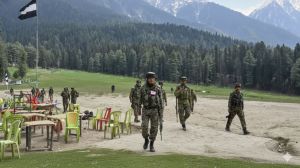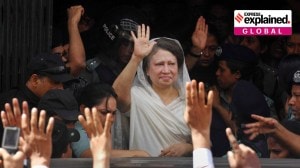An unequal equation
The pace at which India has been ceding strategic space to the Chinese ought to have caused alarm

The purpose of diplomacy for any country is to project its point of view and protect its national interest. National interest includes every aspect of a nation state, its economy, defence, territorial integrity and self-esteem. Any dialogue, which does not factor in all these issues, cannot reflect sound diplomacy. This point is being made in the context of our responses to China over the last three to four years. The pace at which we have been ceding strategic space to the Chinese ought to have caused alarm. It is quite surprising that it has not. Clearly there is tacit acceptance of our unequal equation. More distressingly, there also seems to be an almost fatalistic acceptance of our incapacity to redress matters.
Look at the recent examples of our muted response to the trampling of our national pride and the acceptance of the violation of our sovereignty. The Chinese deny visa to an officer of the government because he is a resident of Arunachal Pradesh. We lump it. The Chinese protest when our prime minister visits Arunachal Pradesh. We remain silent. As a matter of fact a widely held view is that our PM avoided visiting Tawang for fear of further annoying the Chinese. If that were true shouldn8217;t the nation be asking questions? It can even be contended that the claims over Arunachal Pradesh 8212; that the Chinese have recently become assertive about 8212; are perhaps a consequence of what we have conveyed to them during the border talks. The spirit of accommodation that we may have eagerly conveyed could have been taken by them to mean a willingness to concede or a sign of weakness. There is definitely a requirement to analyse the change in posture of the Chinese over the last three to four years.
More recently, let us look at our responses to the protests that have broken out in Tibet and the Tibetan demonstrations in Delhi, Dharamsala and elsewhere around the world. Agreed that when living in a glass house we ought not to throw stones at our neighbours, but the neighbours must also understand the wisdom of this proverb. Sometimes practicing 8216;do unto others what they do unto you8217; is an effective way to convey a point. So why are we shying away from taking the position that we are a democratic country and our constitution gives the right of free expression and speech to its people. Our laws permit peaceful demonstrations and protests. Thus while we try and ensure an uninterrupted passage of the Olympic Torch we also allow people to display their unhappiness to coincide with the procession. Why are we trying to convey the impression that we are bending over backwards to address the concerns of the Chinese Government.
We certainly want good relations with China. It is in the interest of both countries to cooperate and prosper rather than have an adversarial relationship that would inevitably tend to have a negative impact on economic growth and social development. But we forget that unbridled appeasement never works. Merely because China8217;s growth story has a decade and a half8217;s head start does not mean that we cannot catch up. Even if we do not expect to bridge the gap in the foreseeable future, we can still retain the capacity to defend our interests through a combination of defence preparedness and some deft diplomacy. A close look at the military equation would reveal that with some focussed effort and without incurring excessive expenditure the balance can be altered to dissuade the Chinese to back off from their present levels of arrogant belligerence. While on this issue we should also take note that given the growth trajectory of both countries 8212; as also national aspirations 8212; the fallout of any military confrontation will hurt the Chinese more than it will hurt us.
What the Chinese have achieved in the last three decades is indeed awesome. That it is striving to challenge the US8217; global supremacy is worthy of admiration.
But all this does not mean that the country is without problems and vulnerabilities. Given that the country is not a democracy the challenge of perpetuating regime legitimacy is in itself a problem, which will continue to get increasingly complex. Then it also has ethnic minorities to contend with. Besides Tibet it has other provinces in the North West that are not entirely stable. To cap it all is the Chinese obsession with Taiwan. The way things are indicate that the problem does not have easy answers.
Militarily also the Chinese have yet to achieve satisfaction levels with there modernisation plans. Access to technology is again relatively more difficult for them. The percentage of vintage equipment with the PLA is much higher than what our armed forces have. They do have the advantage of numbers but we all know that just numbers need not necessarily be decisive. Given the distances from the mainland and also the intervening rugged terrain, force build up and the attendant logistics pose serious handicaps notwithstanding the new rail line recently completed. Add to this the factor of an unfriendly population in the area of operations. The emerging picture from our perspective is then not so daunting.
So why are we behaving so meekly? After all despite the humiliating defeat of 8216;62 we did not think of surrendering territory. We stuck to our territorial claims and maintained that the area of Aksai Chin under Chinese occupation 8212; was illegal. In 1986-87 we stood firm over Sumdorong Chu and demonstrated that we would not be deterred by the prospects of a military confrontation. Our offensive military deployment for Operation Falcon perhaps had the desired effect. The attitude of Beijing softened. This led to Rajiv Gandhi8217;s visit to China in 1988. The positive outcome was the agreement of 1993 to hold border negotiations according to the principle of 8216;mutual and equal security 8216;. What has slipped since then-political will or military capability? Did we go nuclear for nothing?
Twenty years later when our economy is on a much sounder footing and the whole world is askance with the projections of an emerging India, we should be much more confident and assertive. Instead we have a respected TV channel asking the Nation 8216;Can India afford to be antagonistic to China8217;. Happily, and not surprisingly, the Indian peoples8217; response was a 8220;Yes8221;.
The writer is former director general, artillery vinayshrygmail.com
- 01
- 02
- 03
- 04
- 05































